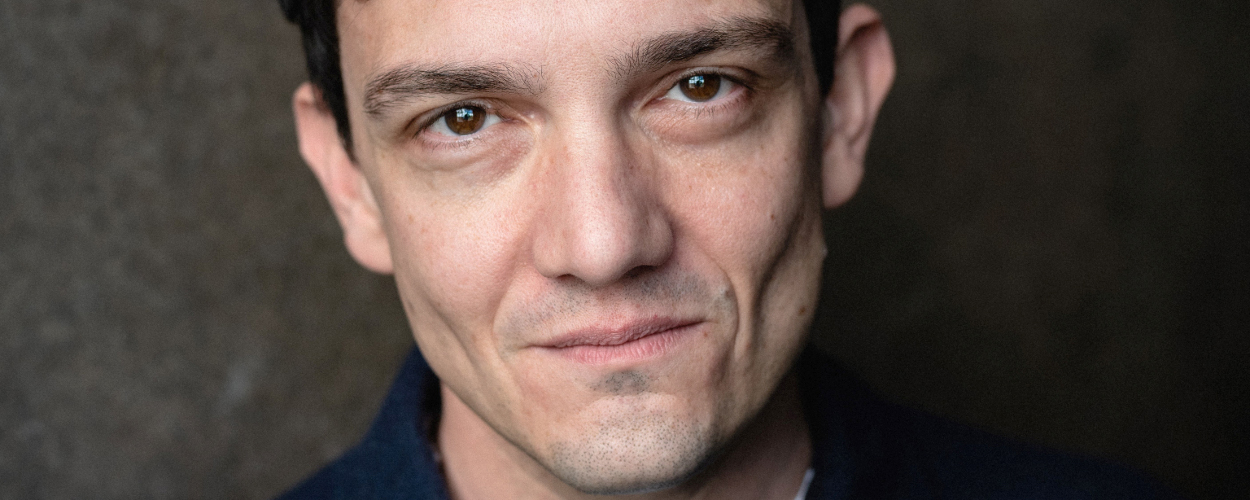This website uses cookies so that we can provide you with the best user experience possible. Cookie information is stored in your browser and performs functions such as recognising you when you return to our website and helping our team to understand which sections of the website you find most interesting and useful.
Caro Meets Dance & Physical Interview Theatre Interview
Sebastian Armesto: Moby Dick
By Caro Moses | Published on Friday 19 April 2024

We’ve long been admirers of simple8 and their acclaimed physically rich and minimally staged productions, and so we were pleased to hear that they’re bringing their excellent adaptation of ‘Moby Dick’ back to London this month, with a run at Wilton’s Music Hall.
I’m pretty sure most of you know what ‘Moby Dick’ is about, but I still thought it would be useful to find out more about how Melville’s narrative was used to create a script for this show.
The adaptation was written by Sebastian Armesto, simple8 co-founder, and an actor you’re also no doubt familiar with thanks to his on-screen work. I spoke to him about the play ahead of opening night.
CM: So, I think most people have a vague idea of what ‘Moby Dick’ is concerned with – ie that it involves a whale – but can you nonetheless tell us a bit about the narrative of the story? Who is it about and what happens to them?
SA: Correct, it does concern a whale. But the novel focuses on those hunting said whale. The story’s narrated by Ishmael, a schoolmaster, who when feeling down and angst-ridden goes sailing.
He ends up on a whale ship called the Pequod under the command of the one-legged Captain Ahab, who sees the voyage as a single-minded mission to seek and destroy the whale that lost him his leg.
What happens is best left to be discovered.
CM: Does your adaptation of it stay close to the narrative of the book?
SA: As much as a two hour play can stay close to a six hundred page novel. But a lot is filleted. There are some differences from the novel – the adaptation kills a character early. But I hope it’s close to the tone and spirit of the novel.
CM: What themes does the show explore?
SA: How individuals work within the bounds of a collective enterprise. The crew are individuals who have to bend and shape their own needs and desires around a collective endeavour.
It’s why we hoped that an ensemble theatre approach would be suitable, because there’s the same see-saw between individual needs and collective labour. And we thought that post-COVID, after we’ve all made sacrifices for some greater societal good, this seemed interesting.
And I suppose the show also looks at environmental destruction. Whaling was for a brief period a mega-industry because the oil it harvested was used for light. It ravaged the whale population while also using every scrap it could of every whale it had. The story’s a grim reminder, or premonition, of the consequences of ravaging nature.
CM: How did you come to be doing this adaptation and what made you want to?
SA: I read the book and thought that it would make sense on stage. You don’t meet Moby Dick until the last few pages. Most of the book is spent endlessly imagining him, so the imaginative forces upon which theatre plays seemed apt.
CM: How do you go about doing an adaptation like this? What’s the process like?
SA: I spent five years thinking about it, and read the book a lot, and then wrote it in two weeks. And then it’s changed and morphed through two rehearsal processes. In a way it’s been a steadily evolving adaptation. The version now is different from the first.
CM: Evoking the sea in a theatrical performance seems like a challenge. Is it a challenge for the writer of the piece, or for the director, and cast?
SA: No one rolls a sheet around. Though often the simplest and even most clichéd effects are the best because they work. A friend of mine did panto with a writer who always had the same underwater sequence in every show which involved throwing fish on stage. We don’t throw any fish either.
CM: Have you been involved in the ongoing production? Can you tell us a bit about the creative team?
SA: Yes, helping produce it as a member of simple8 and as a writer on hand should director Jesse Jones need me. Jesse is artistic director with co-producers Royal & Derngate, Northampton, and has done a brilliant job of assembling a great crew of performers and off stage practitioners.
Kate Bunce has designed a clever and versatile set that’s lit gloriously by Johanna Town, and Rachael Nanyonjo is the movement director, and the adaptation calls for the impossible, which amazingly she’s realised onstage.
CM: Can you tell us a bit about yourself now? How did you come to be working in the arts?
SA: I’ve been an actor for 20 years and always wanted to do it. I went to drama school when I was eighteen and was fortunate to get an agent. In 2008, with friends from drama school, I helped form simple8 so that we could make our own work and put big stories on stage. Amazingly we’re still going.
CM: What aims do you have for the future? What’s coming up next for you after this?
SA: We – ie simple8 – are premiering a play at Southwark Playhouse in October to coincide with the US elections about John Wilkes Booth, who was a noted Nineteenth Century stage star and the assassin of Abraham Lincoln. It’s called ‘Land Of The Free’.
‘Moby Dick’ is on at Wilton’s Music Hall from 23 Apr-11 May. See the venue website here for more information and to book.
LINKS: wiltons.org.uk | www.simple8.co.uk | twitter.com/simple8theatre






